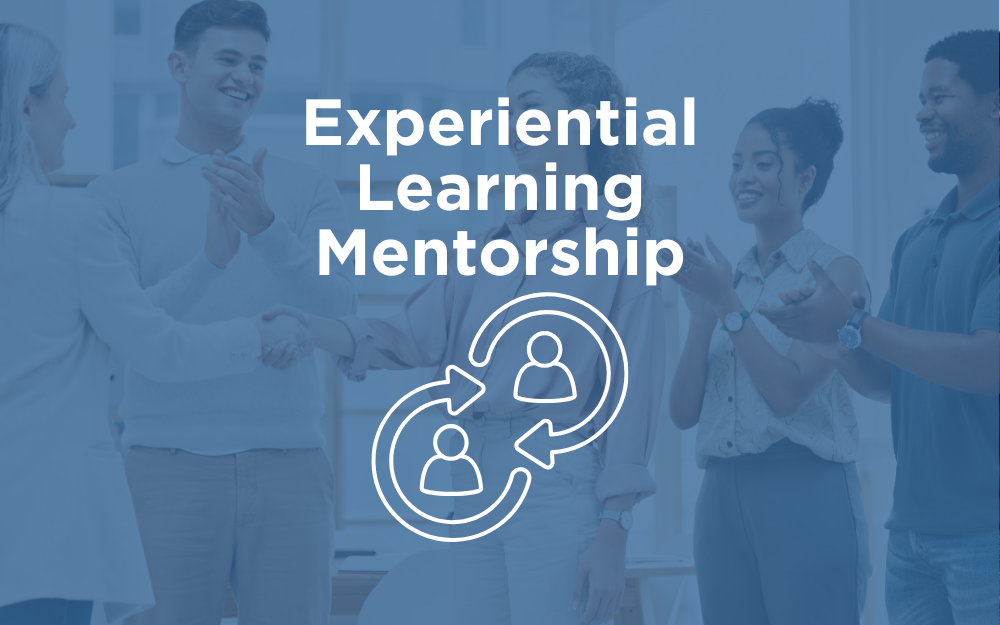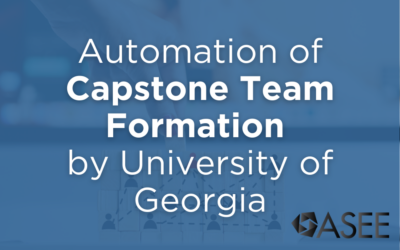In the 2023-2024 academic year, only 20% of experiential learning projects that ran in the EduSourced Experiential Learning management system included a project mentor. These mentors are separate from the project client and the client faculty. Mentors are often referred to as either mentors, advisors or coaches by Experiential Learning programs. We believe tying a university mentorship program in with Experiential Learning compounds the career-readiness benefits of EL projects for students while making the program a bit easier to manage with the helping hand of a mentor network to support where needed.
Our 2024 benchmark study uncovered several pain points in running an Experiential Learning program related to being stretched thin in overseeing projects. We believe including mentors can help with overseeing many EL projects at once. Below are collected insights from some of our clients who leverage mentors in their Experiential Learning teams. For this article, we interviewed four schools who use EduSourced and leverage project mentors in their Experiential Learning programs to explore key aspects of building and leveraging successful mentor programs in Experiential Learning programs and courses.
The programs profiled in this article are:
- MBA Business Consulting Capstone at Baruch college Zicklin School of Business
- UTDesign EPICS at University of Texas Dallas Jonsson School of Engineering and Computer Science
- Experiential Learning Center (ELC) at Northern Illinois University College of Business
- Bauer Office of Experiential Learning at University of Houston Bauer College of Business
Building your Mentor Network
Recruiting an effective pool of mentors with relevant expertise and experience is crucial for any university mentorship program but because Experiential Learning projects are real-world, the stakes here are even higher.
- Engage Former Students: Former students who completed the Experiential Learning program or course, especially those who have excelled in the program, are excellent candidates for mentorship roles. As new EL programs mature, this pool naturally grows so keeping a record of all past students will be a critical resource over time. Experiential Learning is an insular thing but these grads have firsthand knowledge of your program’s structure and demands and can offer valuable guidance to your current students. Implementing a junior mentor program, where experienced students mentor newer ones, can be especially beneficial.
If you foster a good sense of comradery and community within your Experiential Learning program, and do things to get the students excited about the program and the impact they are having, they naturally want to stick with the program and give back.
Dr. Jeanie Aird, Director of Instruction, UTDesign EPICS at UT Dallas College of Engineering
- Leverage your Alumni Base: Alumni who have transitioned into professional roles can provide industry-specific insights and real-world perspectives. Their familiarity with the EL program allows them to tailor their mentorship effectively.
- Collaborate with Employer Relations: University employer relations teams possess valuable connections with companies and professionals seeking to engage with academic institutions. This network can be a rich source of potential mentors.
- Tap into Sponsor Companies: When EL programs involve sponsors, requesting mentors from within these companies provides a direct link to industry expertise and strengthens the collaborative relationship.
- Utilize Professional Networks: Faculty coaches, university contacts, and the broader College of Business network can connect students with mentors possessing specialized knowledge relevant to specific projects.
The Experiential Learning Center at Northern Illinois University College of Business uses industry experts to work with the student teams when obstacles arise and additional support is needed. The mentoring structure is based on “friends” of the ELC, and we connect ELC teams to the mentors based on industry knowledge and background. We have found it valuable to maintain relationships with key individuals in the community who the students can connect with for additional support.
Through the professional networks of faculty coaches, NIU, and the College of Business, we can connect students with mentors who can provide the best direction.
Additionally, our ELC advisory board is made up of leaders and professionals from many industries. The board members meet with students at least once a semester to help teams remove obstacles, show support, gain clarity of scope and wideen the stuent’s vision of the project work. Additionally, ELC advisory board members meet with ELC teams individually when needed. We also leverage ouf board to provide educational opportunities to teams through role players or workships specific to the consulting process.
Jason Gorham, Director of Business Consulting at Northern Illinois University College of Business
- Emphasize the “Giving Back” Element: Many professionals are motivated by the opportunity to contribute to the development of future professionals. Highlighting the impact of mentorship and the chance to “give back” can attract dedicated individuals.
- Location Advantages May Apply: Universities located in business hubs like Manhattan can leverage their proximity to attract professional consultants and former executives to serve as mentors.
Over the past couple of years, we have successfully recruited mentors through a few channels:
- Former students: we reach out to former undergrad EPICS students and their firsthand experience with the program makes them capable and passionate mentors. We have also developed a Junior Mentor program, in which current students who have taken EPICS for two or more semesters are eligible to serve as mentors.
- Industry volunteers/school alumni: we tap into our network of professionals from various companies (often UTD alumni) who are interested in volunteering their time and expertise. These individuals bring industry insight and innovative project management methods to our teams.
- Sponsor companies: our EPICS sponsors often provide mentors. These mentors are typically employees who are passionate about giving back and supporting education.
Andrea Turcatti, Director, UTDesign EPICS at UT Dallas College of Engineering
What Makes for a Good Experiential Learning Mentor?
Being an alum of the EL program so they understand the projects. Someone who wants to do it. Someone who understands they’re working with students (sophomores in this case) and views it as giving back/has a developmental lense on the interaction. Bauer has a very high rate of first generation college students and they explain this to their coaches so they understand they’re often the first professionals these sophomore students work with.
Zach Wortzel, Director of Experiential Learning, University of Houston Bauer College of Business
Here are some of the traits we see in our best mentors:
- Knowledgeable: They have a good understanding of the technical aspects related to the project. They are a great learning resource for our students.
- Dedicated time: They spend regular time with the team, often on a weekly basis. This consistent interaction helps build trust and ensures continuous support.
- Motivated to work with students: They are enthusiastic about working with students and are motivated by the opportunity to teach and guide the team.
- Proactive: Mentors are able to build a sense of comradery with the students and are unafraid to ask students about progress, hold students accountable for lack of progress, or remind students to stay on track.
Andrea Turcatti, Director of UTDesign EPICS at University of Texas Dallas College of Engineering
Defining Roles and Expectations for an Experiential Learning University Mentorship Program
Clearly defining the role of mentors and establishing clear expectations is essential for both mentors and student teams. Sources emphasize:
- Terminology: While “mentor” is a common term, “advisor” or “coach” may resonate better with some professionals, aligning with the role’s active guidance aspect. Understanding terminology preferences can enhance recruitment efforts.
- Rigorous Coaching: Mentors leverage their experience to guide student teams, reinforce quality standards, and monitor work delivered to clients.
- Structured Engagement: Clearly outlining the structure of the mentorship program, including timelines, milestones, and the expected time commitment, ensures that mentors can adequately prepare and dedicate sufficient time to students.
- Training for New Mentors: Training sessions for new mentors covering program logistics, expectations, and appropriate interactions with students are crucial. These sessions also set boundaries, clarifying that mentors are not responsible for resolving student conflicts or personal issues.

Additional resources: documents from Zicklin Business Consulting used to communicate with project mentors (labeled as advisors for their program).
Fostering Highly Effective Mentorship: Students and Projects
Sources provide insights into the specific ways mentors contribute to student success and project outcomes:
- Guidance and Expertise: Mentors offer valuable advice on technical and logistical aspects of projects, helping students navigate challenges and make informed decisions.
- Progress Monitoring: Mentors play a key role in ensuring projects stay on track by monitoring team progress, providing feedback, and helping teams meet milestones.
- Professional Opinion and Networking: Mentors offer professional perspectives on student work, providing valuable feedback and connecting students with their professional networks.
- Skill Development: Mentors contribute significantly to student development by fostering essential professional skills, including teamwork, communication, and time management. They can also coach teams on presentation skills, providing feedback and suggestions for improvement.
- Facilitating Client Interactions: Mentors can help teams manage client relationships, ensuring effective communication and adherence to project scope. Their experience can be invaluable in navigating potential challenges in client relations.
Everything we do in our consulting courses simulates what real consulting firms do, including having an engagement manager or engagement director which is what they are called at McKinsey. We call them advisors.
Anthony Farina, Director of Business Consulting at the Baruch College Zicklin School of Business
Retaining Mentors: Building a Sustainable Community
Retaining mentors is crucial for program continuity and building lasting relationships. The sources suggest several approaches:
- Acknowledge and Appreciate Mentors: Recognizing mentors’ contributions through thank-you messages to their supervisors, small tokens of appreciation, and dedicated events demonstrates the value placed on their involvement.
- Foster a Sense of Community: Creating opportunities for mentors to connect with each other, share best practices, and build relationships can enhance their engagement and commitment to the program.
- Professional Development: Offering mentors opportunities to participate in workshops or networking events related to their expertise can contribute to their professional growth while demonstrating investment in their development.
With all of these elements discussed above, schools can establish a university mentorship program that are fully integrated with their Experiential Learning programs. Mentorship in EL provides students with important supplemental guidance, real-world connections, and enhanced professional development opportunities layered on top of already impactful EL projects. Simultaneously, mentors gain the satisfaction of contributing to the success of future professionals while potentially expanding their own networks and expertise.




